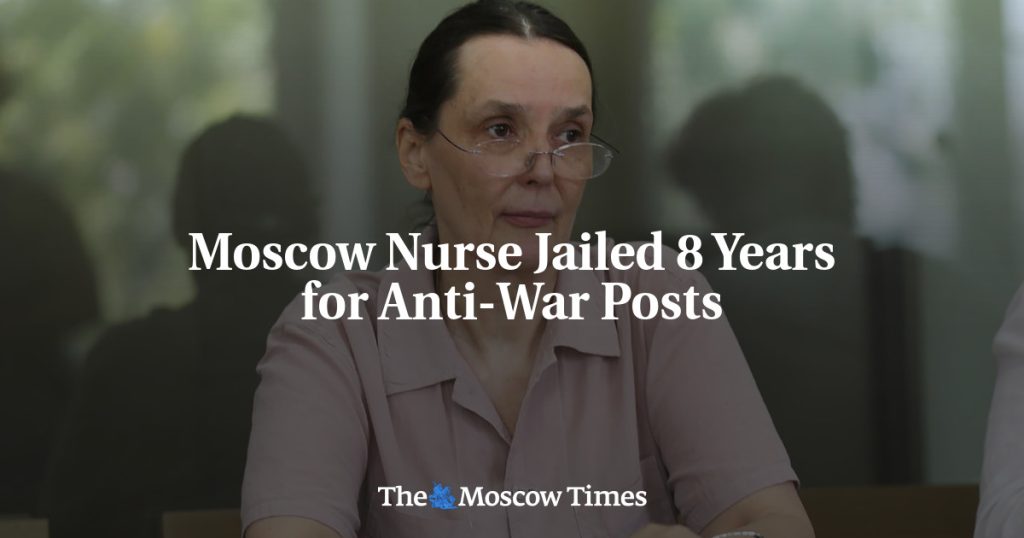The Moscow Times issued a message to its readers regarding the challenges faced by the publication, as Russia’s Prosecutor General’s Office has labeled it as an “undesirable” organization and threatened its staff with prosecution. This designation follows an earlier classification of the publication as a “foreign agent.” The authorities’ actions are seen as attempts to silence independent journalism in Russia, with claims that the work of The Moscow Times “discredits the decisions of the Russian leadership.” The journalists at The Moscow Times refuse to be silenced and seek support from their readers to continue their work in providing accurate and unbiased reporting on Russia.
In a court in Moscow, a 59-year-old nurse named Olga Menshikh was sentenced to eight years in prison for her social media posts opposing Russia’s invasion of Ukraine. Menshikh was accused of spreading “fake” information about the military through two VKontakte posts where she condemned Russian strikes in Vinnytsia, Ukraine, that resulted in 28 fatalities, as well as mass atrocities committed by Russian troops in the Kyiv suburb of Bucha. Despite denying her guilt and stating she had only 15 followers, Menshikh was found guilty of spreading “fake news” about the Russian military’s actions abroad and received the eight-year prison sentence. The nurse had worked at the Pirogov National and Medical Surgical Center, where she treated Russian soldiers who were wounded in Ukraine.
Mediazona reported on the case involving Menshikh, highlighting that she had faced previous administrative arrests and fines for her anti-war social media posts and support for the late Kremlin critic Alexei Navalny. The outlet also mentioned that Menshikh’s account may have been breached, raising questions about the authenticity and accountability of the content she was accused of spreading. Russia’s crackdown on anti-war protests, independent press, and social media platforms has intensified since the country’s military operation in Ukraine began in 2022. The case of Olga Menshikh is one example of the consequences faced by individuals who express dissenting views on the conflict.
The sentencing of Olga Menshikh reflects the broader repression of freedom of speech and independent journalism in Russia, as the authorities target those who criticize the government’s actions, especially regarding the invasion of Ukraine. The Moscow Times, as an independent news outlet, has been particularly affected by these measures, with the publication being designated as “undesirable” and labeled a “foreign agent.” Such actions aim to stifle dissenting voices and limit the circulation of information that may challenge the official narrative promoted by the Russian leadership. Despite these challenges, The Moscow Times remains committed to providing accurate and unbiased reporting on Russia, calling for support from readers to continue their work.
The case of Olga Menshikh underscores the risks faced by individuals who speak out against the Russian government’s policies, particularly in the context of the conflict in Ukraine. The nurse’s social media posts condemning Russian military actions led to her imprisonment, highlighting the severe consequences of expressing dissent in a climate of increasing authoritarianism. As Russia tightens its grip on free speech and independent journalism, individuals like Menshikh face legal repercussions and imprisonment for voicing their opinions, further restricting the space for public debate and critical discourse. The crackdown on dissenting voices poses a threat to the democratic principles of freedom of expression and the press in Russia.
The plea for support from The Moscow Times reflects the ongoing struggle for independent journalism in Russia, where the authorities target media outlets that challenge their narrative and seek to silence dissenting voices. By labeling The Moscow Times as “undesirable” and a “foreign agent,” the government aims to undermine the credibility and legitimacy of independent reporting, as well as intimidate journalists who dare to criticize official policies. In the face of these challenges, The Moscow Times calls on its readers to stand with them in defending open, independent journalism against repression and censorship. The publication’s commitment to providing accurate and unbiased reporting on Russia remains unwavering, despite the risks and obstacles posed by the government’s crackdown on independent media.















